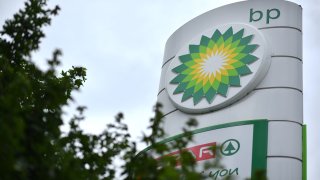
- The British energy major posted an underlying replacement cost profit, a proxy for net profit, of $3.3 billion for the third quarter, above analyst estimates of $3.1 billion.
- "Rising commodity prices certainly helped," CEO Bernard Looney said in the company's earnings report.
- However, the company reported a headline loss of $2.5 billion for the third quarter as a result of "significant adverse fair value accounting effects" which saw the company take a $6.1 billion hit.
Oil and gas giant BP beat third-quarter earnings expectations on Tuesday, fueled by surging energy prices.
The British energy major posted an underlying replacement cost profit, a proxy for net profit, of $3.3 billion for the third quarter, above analyst estimates of $3.1 billion, according to Refinitiv. The figure compares to $2.8 billion of net profit in the previous quarter and $100 million for the same period in 2020, when oil prices collapsed as a result of the coronavirus pandemic.
Get Southern California news, weather forecasts and entertainment stories to your inbox. Sign up for NBC LA newsletters.
This year, international benchmark Brent crude prices have up around 60% to date.
"Rising commodity prices certainly helped, but I am most pleased that quarter by quarter, we're doing what we said we would - delivering significant cash to strengthen our finances, grow distributions to shareholders and invest in our strategic transformation," CEO Bernard Looney said in the company's earnings report.
'Adverse' account effects
Money Report
However, the company reported a headline loss of $2.5 billion for the third quarter as a result of "significant adverse fair value accounting effects." These saw the company take a $6.1 billion hit which it attributed to the "exceptional" rise in forward gas prices towards the end of the quarter.
Looney told CNBC on Tuesday that the discrepancy between the headline and underlying figures was a "simple timing effect" under IFRS reporting rules, which mean BP is "accounting for hedge and not accounting for the value of the portfolio."
He confirmed that this did not mean the hedges had gone wrong, just that the company was "accounting on one side of the equation and not on the other side, as required by IFRS, and this will unwind over time."
Net debt fell to just under $32 billion from $32.7 billion in the second quarter, making a sixth consecutive quarter of reductions.
BP maintained its dividend at 5.46 cents per share payable in the fourth quarter, following an increase of 4% through 2025 announced in the second quarter. It said it was planning a further $1.25 billion share buyback prior to the company's fourth-quarter earnings report.
Earlier this year, BP laid out a 10-year plan to reduce oil and gas production by 40% and boost spending on low carbon energy to $5 billion per year. However, oil majors have been mostly excluded from this week's COP26 climate summit in Glasgow.
"I understand the situation and there is a view amongst some in society that companies like ours are not part of the solution," Looney told CNBC on Tuesday.
He pointed to a slew of deals that BP had completed in the electric mobility space in the third quarter to contest this.
"If you look at the substance in just one sector in one quarter, I think it's hard to argue that we are not part of the solution here," he added.






